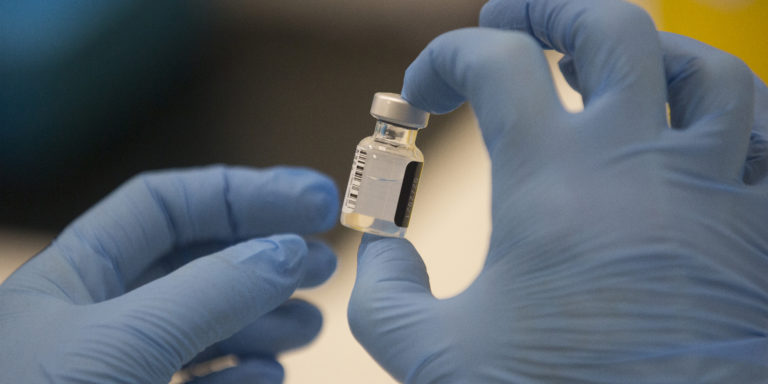INTELBRIEF
December 14, 2020
IntelBrief: Criminals Will Seek to Exploit COVID-19 Vaccines for Profit

Bottom Line Up Front
- The race for a COVID-19 vaccine has created financial opportunities for a range of transnational actors, including organized criminal groups.
- The pharmaceutical industry has long been a target of transnational organized crime.
- There are several vulnerabilities in a complex COVID-19 supply chain that nefarious actors will seek to exploit.
- Law enforcement has raised the alarm regarding the possibility of criminal syndicates aiming to profit at the expense of the medically vulnerable.
As governments facilitate the approval and distribution of COVID-19 vaccines, there will still be myriad challenges associated with the effort. In the lead up to the vaccine deployment, several governments were engaged in efforts to pilfer intellectual property associated with COVID-19 vaccine research. Last week, Chris Krebs, former Director of Cybersecurity and Infrastructure Security Agency, revealed that Russia, China, North Korea, and Iran were engaged in economic espionage efforts to steal intellectual property related to the COVID-19 vaccine. Industrial espionage, the stealing of commercial secrets and intellectual property to gain a commercial advantage over adversaries, remains a primary objective of intelligence services. Just like state actors, transnational actors, especially criminal organizations, have a history of engaging in illicit activities to gain an economic advantage. In this regard, the pharmaceutical industry has been a top-tier target for organized crime and private sector spies. More than 80 companies and institutes are developing vaccines in the United States, United Kingdom, China, Russia, and many more countries, creating a unique environment for global crime syndicates to seek to exploit. Tactical and strategic synergies between various non-state actors, as well as concerns over the crime-terror nexus, elevate the sense of urgency for law enforcement, intelligence agencies, and security services.
Where vaccines are already developed and deployed, the pharmaceutical industry and supply chains are likely to be especially vulnerable. The introduction of fake vaccines into the distribution system during health crises is also of concern. In 2018, the British Broadcasting Corporation (BBC) reported that tens of millions of prescription drugs ended up in the hands of criminal gangs in the United Kingdom who bribed or scammed pharmacists and drug wholesalers. Organized crime groups operating on the Russian-Sino border have a long history of selling counterfeit and stolen prescription drugs. According to the Drug Enforcement Administration 2019 National Drug Threat Assessment, the United States is also awash in counterfeit drugs, which have been illegally distributed by organized crime groups. This includes counterfeit fentanyl from China, which has been an epicenter for the manufacturing of synthetic opioids. Prior to the COVID-19 pandemic, the scale of the challenge of countering pharmaceutical crime, to include fake vaccines, stolen prescription drugs, and counterfeit medical products, is perhaps best exemplified by Interpol’s Operation Pangea, which led to the removal of more than 105 million pills, ampoules, sachets and bottles from circulation over a decade. Interpol’s analysis of those results indicates that it is possible that at least 11% of medical products sold online are counterfeit.
COVID-19 vaccines are a prime target for criminal organizations, with several entry points for illicit actors to insert themselves into the distribution cycle and value chain. Criminal groups could bribe or extort scientists, warehouse employees, and others involved in vaccine production to gain access to formulas or end-products. The transit networks involved in the highly complex logistics of pushing the vaccine to medical professionals who will disseminate the vaccine is often a vulnerability. End-user facilities, such as medical offices and clinics where the vaccine will be stored prior to immunization, are also a weak link where security procedures will vary drastically. At the same time, chemists working for criminal syndicates are likely creating fake COVID-19 vaccines, knowing that the demand for the virus could greatly outstrip supply, at least until the summer of 2021. Desperation to gain access to the vaccine is going to be especially acute among poor countries, particularly now that wealthy countries have already begun hoarding future deliveries. This demand will be one that criminal groups will attempt to fill given the possibility of enormous financial gains. Given increased concern about the relationship between organized criminals and terrorist groups, there may also be opportunities for terrorist groups to exploit these weaknesses for operations or propaganda.
Law enforcement in the United States and overseas has recognized that COVID-19 vaccines will be subject to criminal exploitation. On December 9, the Federal Bureau of Investigation warned that scammers will try to profit from the high demand for the COVID-19 vaccine. On December 4, EUROPOL also warned that organized criminal groups could try to introduce a phony COVID-19 vaccine into the system, similar to the fake flu vaccine disseminated in Mexico in October 2020. Finally, Interpol has also issued a warning that criminal groups are eyeing profit related to illegal activities related COVID-19. In the United Kingdom, where the COVID-19 vaccine is already being distributed, the government has adopted extreme measures to tag, track, and locate the movement of the vaccine from Belgium to the UK. The expense associated with securing the vaccine will be a luxury that only a handful of countries are likely able to afford and implement. There are also questions about whether countries using other vaccines (e.g. Chinese, Russian) will be able to keep those vaccines from falling into the wrong hands. Accordingly, where vaccine security measures remain impractical, people will be vulnerable to COVD-19 scams, and there will be vast disparities in access and equity in terms of receiving a reliable and safe vaccine from reputable health authorities.